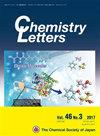CSIML:针对小型不平衡材料数据集的成本敏感迭代机器学习方法
IF 1.1
4区 化学
Q3 CHEMISTRY, MULTIDISCIPLINARY
引用次数: 0
摘要
材料科学研究得益于强大的机器学习(ML)代用模型,但也受限于 ML 对足够大且均衡的数据分布的隐性要求。在本文中,我们提出了一种模型,以获得更可信的结果,适用于小而不平衡的材料数据集以及化学知识。以 2 个带隙不平衡数据集为例,我们展示了我们的模型与采用正常采样和重采样方法的普通 ML 模型相比的可用性和性能。本文章由计算机程序翻译,如有差异,请以英文原文为准。
CSIML: a cost-sensitive and iterative machine-learning method for small and imbalanced materials data sets
Materials science research benefits from the powerful machine-learning (ML) surrogate models, but it is also limited by the implicit requirement for sufficiently big and balanced data distribution for ML. In this paper, we propose a model to obtain more credible results for small and imbalanced materials data sets as well as chemical knowledge. Taking 2 bandgaps imbalanced data sets as instances, we demonstrate the usability and performance of our model compared with common ML models with normal sampling and resampling methods.
求助全文
通过发布文献求助,成功后即可免费获取论文全文。
去求助
来源期刊

Chemistry Letters
化学-化学综合
CiteScore
3.00
自引率
6.20%
发文量
260
审稿时长
1.2 months
期刊介绍:
Chemistry Letters covers the following topics:
-Organic Chemistry-
Physical Chemistry-
Inorganic Chemistry-
Analytical Chemistry-
Materials Chemistry-
Polymer Chemistry-
Supramolecular Chemistry-
Organometallic Chemistry-
Coordination Chemistry-
Biomolecular Chemistry-
Natural Products and Medicinal Chemistry-
Electrochemistry
 求助内容:
求助内容: 应助结果提醒方式:
应助结果提醒方式:


